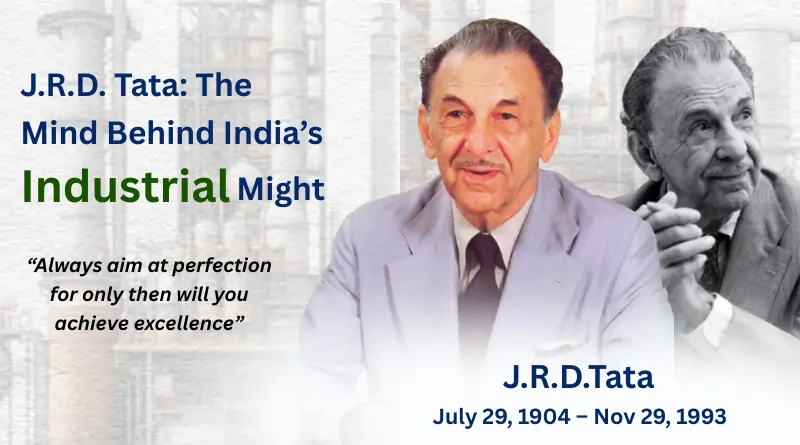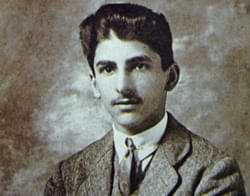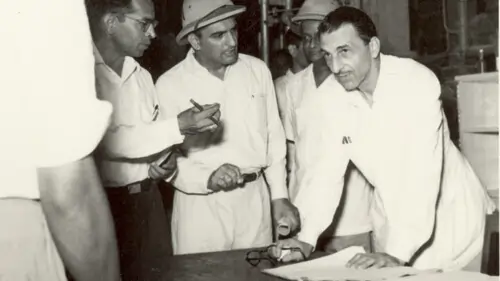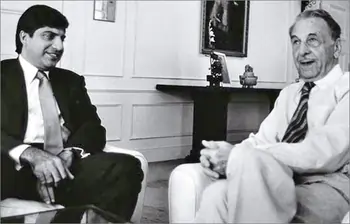
Bharat Ratna JRD Tata’s 121st Birth Anniversary: Honouring a Nation Builder

Today marks the 121st birth anniversary of Mr. Jehangir Ratanji Dadabhoy (JRD) Tata, whose work in aviation, automobiles, IT services, and social welfare significantly contributed to India’s post-independence development.
Popularly known as JRD, Mr. JRD Tata was born on 29th July 1904 in Paris, France to Mr. Ratanji Dadabhoy Tata and Suzanne Brière. He spent much of his childhood in France and India and his education journey was diverse, spanning across France, Japan, England and India. He also served in the French-army for one year.
JRD Tata Joining The Tata Group and Founding Air India
In 1925, at the age of 21, JRD joined the Tata Group as an unpaid apprentice. A year later, following the death of his father, he became a board member of Tata Sons. In 1929, he renounced his French citizenship and became an Indian citizen, committing himself to the country’s future.
JRD: Industrial Expansion and Business Leadership
Just at the age of 34, JRD Tata became chairman of Tata Sons, a position he held for over five decades. He was the youngest member of the Tata Sons board. His leadership transformed the Tata Group from a collection of 14 companies into an industrial empire of 95 enterprises. He established Tata Motors in 1945, which began with locomotives and later expanded into commercial vehicles and passenger cars. In 1968, he founded Tata Consultancy Services (TCS), now a global leader in IT services. He also launched Titan Industries in 1987.
JRD Tata actively promoted professional expertise and entrepreneurial talent within the group. He was renowned for maintaining the highest ethical standards, refusing to use bribes or shortcuts.

Mr. JRD Tata also supported the development of institutions focused on scientific research, healthcare, and education. He founded Tata Institute of Social Sciences in 1936 and Tata Institute of Fundamental Research in 1945, among others. His labor policies such as the eight-hour workday, free medical aid, and accident compensation, were ahead of their time and later became statutory norms in India.
Mr. JRD Tata’s Role in Shaping National Policy and Public Service
Beyond business, Mr. JRD played an important role in shaping India’s economic and industrial policy. As one of the architects of the 1944 Bombay Plan, he advocated for planned industrialization and inclusive growth. He firmly believed that industry should serve the community, not just shareholders.
“No success or achievement in material terms is worthwhile unless it serves the needs or interests of the country and its people and is achieved by fair and honest means.”
He served on several government committees, including one formed after the 1962 India-China war to design a 10-year roadmap for strengthening the Indian Air Force. He was also involved in India’s nuclear energy program and served as the longest-standing member of the Atomic Energy Commission, acting as a crucial bridge between scientists and the government.
In recognition of his contributions, he was awarded the Padma Vibhushan in 1955 and the Bharat Ratna in 1992.
JRD’s Vision Carried Forward by the Next Generation

In 1991, Mr. JRD Tata stepped down as Chairman of Tata Sons and appointed Ratan Tata as his successor. Their relationship was defined by mutual admiration and shared values. Under Ratan Tata’s leadership, the group expanded its global footprint, further building on JRD’s legacy.
Legacy that Continues to Inspire
Honourable Mr. JRD Tata passed away on 29th November 1993. His vision, ethics, and commitment to nation-building continue to inspire generations of leaders and entrepreneurs. From aviation to education, and from technology to social reform, the institutions and values he shaped remain pillars of modern India.
On his 121st birth anniversary, JRD Tata is remembered not only as a business leader but also as a visionary who laid the foundation for ethical entrepreneurship and industrial development in India.



